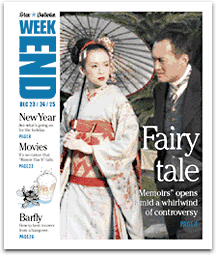
DEC. 23/24/25 |
 |
Cinderella in kimonos
'Memoirs of a Geisha" is a rare work of art, an American film based on Arthur Golden's best-seller, with the lush, languid look of Chinese cinema.
Director Rob Marshall, who brought a noirish sensibility to the theatrical "Chicago," covers some of the same territory here, layering despair with an easy grace and sensuality.
"Memoirs of a Geisha"
Rated PG-13
Opens nationwide Friday
   
|
So sumptuous and mesmerizing are the visuals, so perfect the acting, that their combined impact will lead most to perceive this film as something greater than what it is -- a thoroughly American "Cinderella"/"Pretty Woman" story, sap and all. That's OK. As a big-screen confection, it's every bit as dazzling as "Chicago," and as an "event" film is not to be missed.
Those with an appreciation of Japanese culture and aesthetics will be enthralled by the backdrops, the colors and patterns of the kimonos, obis and hair ornaments from both Taisho and Showa periods. Such details are best appreciated on the big screen.
The film immediately transports viewers into 1930s Kyoto, where the narrow, densely populated streets of the "hanamachi" (geisha district) reflect the claustrophobic aura of the geishas' insular world.
It's there that high-spirited Chiyo is sold to a geisha house while her less promising sister is sold to a brothel. Suzuka Ohgo carries the first part of the film on her 12-year-old shoulders as a geisha hopeful who looks like a combination of star Ziyi Zhang and Haley Joel Osment. Ohgo may drive some to tears early on.
Chiyo is tormented by the house's celebrated geisha Hatsumomo, who sees in her eyes a potential rival. Li Gong (or Gong Li), so often seen in sympathetic roles in Zhang Yimou's films, such as "Ju Dou," "Raise the Red Lantern" and "The Story of Qiu Ju," unleashes her dark side here and revels in playing the tempestuous and devious Hatsumomo, who dashes Chiyo's hopes of ever becoming a geisha.
In a life filled with slave labor and loss, a few kind words from a stranger on a bridge change Chiyo's world forever. It's problematic that the charismatic "Chairman" (Ken Watanabe) she falls in love with appears to be two to three decades her senior, but these things do happen in life, and in a fairy-tale story are somehow acceptable on celluloid. The same is true regarding the bartering of her virginity.
A second savior is found in kind-hearted and level-headed Mameha (Michelle Yeoh), a rival of Hatsumomo, who mentors Chiyo for mutual benefit.
COURTESY OF COLUMBIA PICTURES
Young Chiyo (Suzuka Ohgo) meets the "Chairman" (Ken Watanabe), an encounter that changes her life.
|
|
In their first English-speaking roles, Zhang and Gong are credible, and with Yeoh elevate the script and dialogue with a gravitas rarely seen in American films, even when delivering such campy lines as Hatsumomo's "I will destroy you!" -- already clear from her tirades.
I guess American filmmakers assume Americans don't get subtlety. Contrast this potential Oscar contender with another potential Oscar contender, "Brokeback Mountain," an American story filmed by a director originally from Taiwan. There, a lifetime of hurt, shame and disappointment is communicated through Heath Ledger's face with little of the "I will tell you everything I feel" sort of dialogue.
The rest of "Memoirs of a Geisha" carries on in "Rocky," "Karate Kid" or "Million Dollar Baby" vein, with Chiyo, a latecomer in the trade by now, trying to catch up on her training until Mameha deems it is time for her debut as "maiko" (apprentice geisha) Sayuri.
While the movie moves slowly up to this point, war turns the geisha world upside down and the movie speeds up as if to keep pace with modern times. It's a jarring juxtaposition, capturing the unsettling nature of Sayuri's return to a world that's ugly and coarse, where she tries to reclaim a past life that in the new world order seems more quaint than it really was.
As always, Zhang is a fireball behind a facade of calm, and she soars in a couple of solo dance scenes. Her kabuki-like debut dance performed onstage under falling confetti snow is breathtaking.
The question now is, How will the film play in Japan and China, where the three ethnic Chinese female leads have been criticized for playing Japanese roles?
The film has been criticized for many issues beyond simple storytelling, with many critics seeming to expect a documentary rather than a romance. That has a lot to do with the enduring mystique and interest in the geisha world and a discomfort with all the baggage that entails.
Forget the quibble over the actresses; it would have been interesting to see what a Japanese director would have done with this tale.
BACK TO TOP
|
Movie producers defend their casting choices
By Ben Nuckols and Min Lee
Associated Press
The makers of "Memoirs of a Geisha" expected to be lauded for creating the first big-budget Hollywood movie with Asian actors in every leading role. Instead, they find themselves defending casting decisions that have inflamed historical tensions between Japan and China.
The English-language film is set in Japan and adapted from the American novel. It stars Chinese actresses Ziyi Zhang and Gong Li, and Chinese-Malaysian actress Michelle Yeoh. They join several Japanese performers, including Ken Watanabe.
For months, the Internet has been filled with vitriolic debate over cultural insensitivity, and Zhang has been denounced in China for her starring role. The arguments boil down to this: A movie about Japanese culture should have a Japanese actress in the lead.
The filmmakers, however, thought that would be shortsighted and discriminatory. Producers Douglas Wick ("Gladiator") and Lucy Fisher, and director Rob Marshall ("Chicago"), say the casting was an exhaustive, meticulous process that considered acting ability, star power and physical traits.
"Some Japanese actresses didn't even want to audition, because they couldn't speak English and were too afraid to try to take it on," Fisher said.
The debate is somewhat perplexing considering that actors have been playing characters of different nationalities throughout the history of film.
"When you saw 'Zorba the Greek,' and you saw Anthony Quinn play Zorba, was that odd to you because he was Irish and Mexican?" Marshall said. "Or when you saw 'Dr. Zhivago,' and you saw Omar Sharif, who's Egyptian-born, play a Russian, was that something that threw you?"
Gong said she chooses roles based on substance, not race.
"As actors, we seek roles that challenge and inspire us," she said in a statement to The Associated Press. "Think of all the amazing performances that would be lost -- Meryl Streep as a Polish woman in 'Sophie's Choice'; Russell Crowe as an American in 'The Insider'; Ralph Fiennes as a German in 'Schindler's List'; Vivien Leigh as an American in 'Gone With The Wind'; Sir Anthony Hopkins as an American President in 'Nixon,"' Gong said.
But the symbolism in "Geisha," set for limited release Friday, is powerful for many Chinese.
COLUMBIA PICTURES
Michelle Yeoh, right, as Mameha, mentors Ziyi Zhang's character in the sweeping romantic epic "Memoirs of a Geisha."
|
|
During Japan's 1937-38 occupation of Nanjing, Japanese troops killed at least 150,000 Chinese civilians and raped tens of thousands of women.
Today, there is tension over Japanese Prime Minister Junichiro Koizumi's repeated visits to a shrine that honors some convicted war criminals, as well as the territorial dispute over the Diaoyutai or Senkaku islands. In April, Chinese demonstrators vandalized shops and smashed windows at Japanese diplomatic offices while protesting Japanese textbooks they claim whitewash the country's war atrocities.
Such history has created an Asian climate so sensitive, South Korean actress Yun-jin Kim, best known to Western audiences for her role on TV's "Lost," reportedly turned down a role in "Geisha" for nationalistic reasons.
But the American filmmakers had other concerns, like star power and ticket sales.
Zhang and Yeoh co-starred in the box-office hit "Crouching Tiger, Hidden Dragon," and Zhang has since become the international face of Chinese cinema with roles in "Hero," "House of Flying Daggers" and "2046." Yeoh became the first Asian Bond girl in "Tomorrow Never Dies." And Gong gained a devoted cult following thanks to her work in "Raise the Red Lantern" and "Farewell My Concubine."
"Obviously...the more well-known the faces are, the happier the financiers are," Fisher said.
But does popular casting mean authenticity is sacrificed? Marshall is quick to point out that while he did extensive research into geisha culture, realism was not his chief concern.
"I never intended to do this movie as a documentary-style version of the novel," Marshall said. "It really is a fable."
Still, anticipation for the movie remains high in Japan, and it has been cleared by Chinese censors.
"Most of the Japanese audience who attended the premiere of this film had positive reactions," Jay Sakomoto, president of Shochiku Co., Japan's largest movie distributor in Japan, said in a statement. "Ziyi Zhang's portrayal of Sayuri was impeccable, and many people thought she seemed more Japanese than a real Japanese woman."

